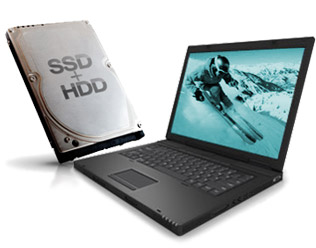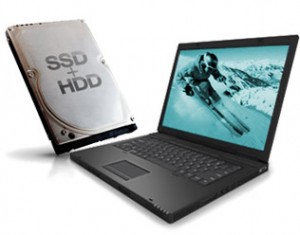Hybrid drives are storage solutions that provide the best of both worlds: The speed of solid state drives and the capacity of hard disk drives. They work by relegating all the most frequently accessed files to the SSD portion, while the rest of the data is stored on the HDD side.
While most computer companies prefer SSDs for their laptops, there is still something to be said for the high storage volume of HDDs (not to mention the fact that SSDs aren’t exactly the cheapest laptop parts around). To address the question of improved performance vis-a-vis high capacity, disk drive manufacturers sought two alternatives for their consumers.
The first is the aforementioned SSD-HDD hybrid drives, which are still slower than full-fledged SSDs but are nevertheless more affordable and practical. The second alternative is 7200 rpm HDDs, up from the 5400 rpm of regular hard drives. Being HDDs, these drives have high storage capacities to go with high overall speeds almost comparable to hybrids (although still falling short in top speed).
Both alternatives have their own pros and cons (7200 rpms are cheaper, hybrids access important system files faster, etc.), but in January’s Consumer Electronics Show 2013, Seagate announced that it was phasing out 7200 rpm hard drives in favor of its latest hybrid drive. The company’s third hybrid iteration (following the Momentus XT 500 GB and the Momentus XT 750 GB), this latest Seagate hybrid features a staggering 8 GB of flash memory to go with the increased hard disk storage space. In tests conducted by Seagate, the 3rd-gen hybrid (which has a 5400 rpm HDD) even outperformed 7200 rpm HDDs by considerable margins.
Perhaps more excitingly, Seagate recently made another announcement: The 3rd-gen hybrids will also be available for desktops; a first, to be sure. Laptop hybrids will come in 500 GB and 1 TB capacities, while desktop hybrids will be available in 1 TB and 2 TB variants.
This is definitely great news for desktop users. SSDs are available for desktops too, of course, but unlike laptop parts, desktop CPUs and RAM are replaceable with faster parts (and don’t even get me started on overclocking), which means that when it comes to disk drives, storage is the main concern more often than not. With hybrids coming their way, though, desktop users can finally get to enjoy even faster access times than ever before (and more so with higher caliber CPUs and RAM) without sacrificing disk space.
Looks like Seagate has got another winner on its hands!
Article by Hathem Brand.


